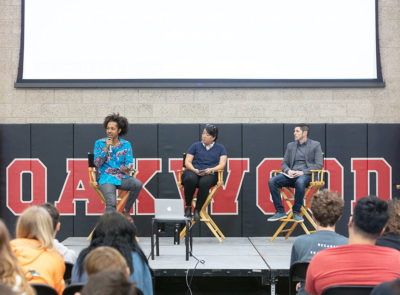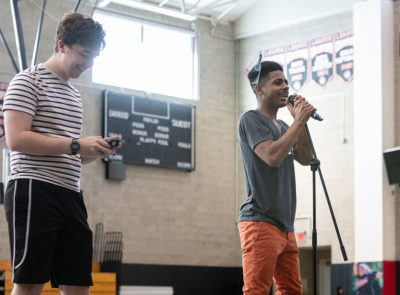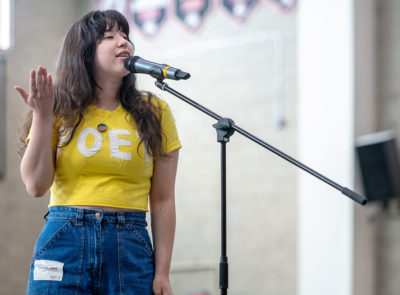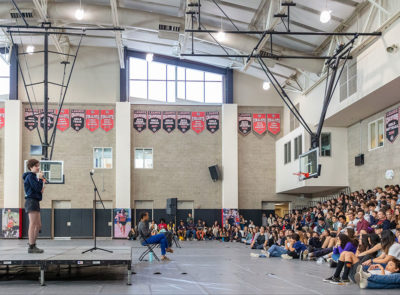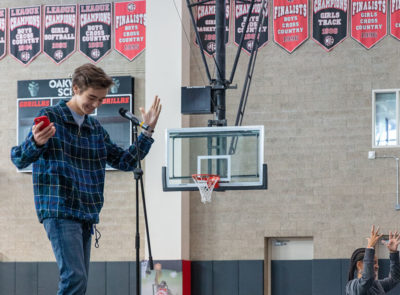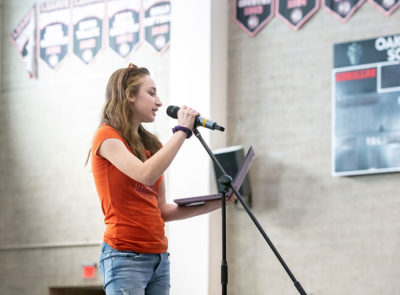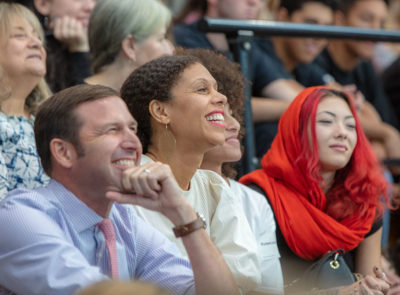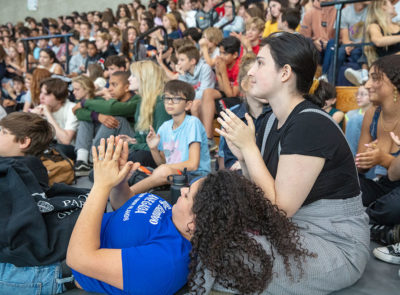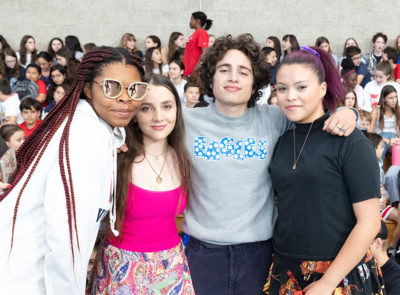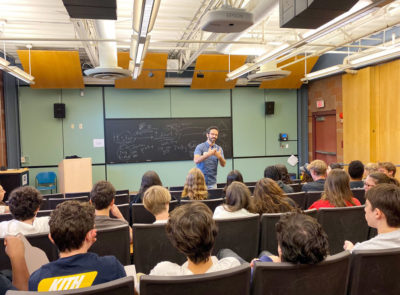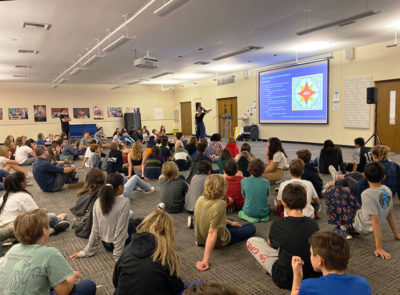Oakwood strives to create a community in which students and adults engage in challenging, collaborative, and respectful learning experiences. An important part of each school year is Diversity Week, our annual weeklong series of talks, discussions, workshops, performances, and community gatherings on the secondary campus that encourage self-reflection and acknowledgment of perspectives beyond our own.
Courageous Conversations at Diversity Week, 2019
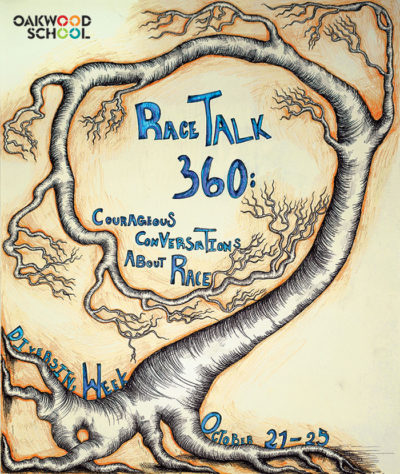
This year’s theme, Race Talk 360: Courageous Conversations About Race, set forth the following objectives—all of which are central to the school’s ongoing work on diversity, equity, inclusion, and social justice:
- To explore the ways in which race and racial tensions emerge on personal, interpersonal, institutional and cultural levels
- To examine what role each of us plays as part of a racialized community/society
- To define terms such as dominant culture, ethnicity, marginalized, privilege, race, racism; and unpack what they mean
- To recognize that the intersections of our identities significantly impact our experiences
- To determine and take actions to make the Oakwood community more inclusive, where ALL self-identities are valued and affirmed
Diversity Week began with a special assembly featuring multiple voices. Below are excerpts from teachers and students who set a tone of thoughtful inquiry and reflectiveness that continued throughout the week as stories were shared in groups large and small, public and private:
Head of School Jaime Dominguez opened Diversity Week by connecting Race Talk 360 with the school’s year-long theme, Better Together, reminding us how both echo ideals of the school’s founders. He also noted that sometimes, courageous conversations can lead to discomfort:
“One of the reasons why people question the amount of time we devote to this is because they feel this work is uncomfortable. I’m here to tell you that just like playing a sport or just like working out, there’s a little bit of discomfort, and that discomfort is what you’re actually looking for.”
“As in working out, you want to stress your body out a little bit because each time that you do, you build muscle, and that’s uncomfortable. Learning is uncomfortable. That’s actually when you know that you’re actually learning something—when it makes you feel uncomfortable. It’s not like sitting down at the park. It is supposed to invoke something within you. That’s when you know you’re learning. Our goal this week for you is to provide a space and a time to practice, to interrogate some of these big concepts and these big issues, to have opportunities to discuss, so that at the end of the day, Oakwood is a better place.”
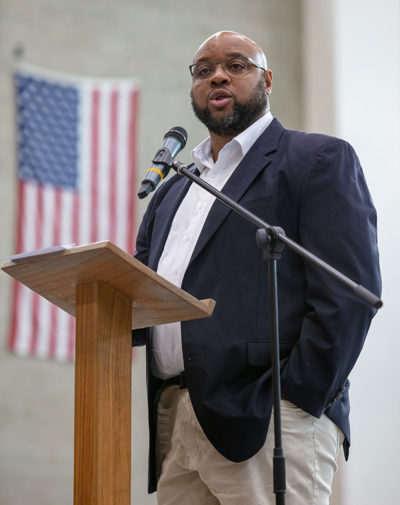
High School Dean of Students Shadeed Elliott shared stories about growing up in “a small, predominantly Black city, with a high crime rate and an even higher poverty rate…”, about the discrimination faced by his mother, a devoted teacher, and about his own experiences with racial profiling. He went on to explain how his past translates into current work on diversity, equity, and inclusion at Oakwood:
“Courageous conversations aren’t about dwelling in the past. They are about the here and now. The Diversity Week theme asks us to look at our world through the lens of race in the present, so that, together, we can build what we want for our future. Yes, both the present and the future are influenced by the past, and those who forget the past are doomed to repeat it. But to be truly courageous and engaged in meaningful discussions, we must root ourselves in the present moment. Stay engaged. Be open to discomfort.”
The fact is, this week requires work. It asks of you to be in touch with your humanity in ways that you may have not been asked to do before. Courageous conversations are not supposed to be nice or easy. (Now hear me, they are supposed to be respectful and stimulating.) The conversations you have this week should be, no, must be challenging and real. It’s the only way to grow. These conversations require passion, integrity, and authenticity.
Shadeed ElliottLinda Rose-Winters, Director of Diversity, Equity and Inclusion Programs K–12, connected the goals of Diversity week to the school’s philosophy. She also encouraged students to “try on a different way of engaging than usual. To lean in. To take some risks,” reminding us to approach Diversity Week with patience and curiosity:
“In the first paragraph of Oakwood’s Statement of Philosophy, it says that the founding parents wanted a learning community which would foster independence of thought, intellectual integrity, sensitivity to the needs of others, and prepare students for participation in a democratic society.”
“Further into the statement, where it lists the five tenets of an Oakwood education, it reads: We intend an Oakwood education to cultivate depth of character. We seek to nurture students’ empathy, imagination, and moral courage; to foster a sense of responsibility and humility, along with a habit of service; and to instill a lifelong commitment to social justice. We intend for the development of their intellect and character to be intertwined so that their choices are guided by internal controls and sensitivity to the needs of others.”
“And, in the last tenet, number five, it goes on to say: We intend an Oakwood education to foster a sense of community. We seek to create a vibrant public life in the school, where students learn to express themselves fluently and responsibly and to consider differing perspectives respectfully. We believe that an environment most conducive to learning and growth is diverse and inclusive.”
“These are the reasons why, during the 14th annual Diversity Week, we are carving out some time to collectively engage in Race Talk 360: Courageous Conversations About Race.”
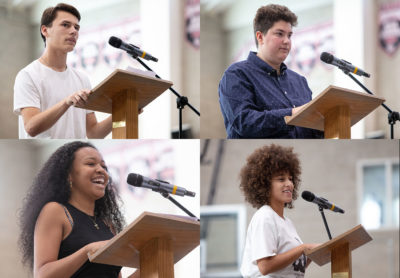
The highlight of the opening assembly was three students, Jacob ’20, Sienna ’21, Kennedi ’20, and alum Rebecca Franklin ’12 taking the stage to courageously share their own personal experiences.
Jacob spoke about how his understanding of racial dynamics had grown over time, after coming from a school community before Oakwood where he was one of very few white students. While he was nervous to share this story, he concluded with a inspiring message, “What I think we all need to remember, and what took me a long time to realize, is that your race affects you no matter what race you are. Everybody’s opinion matters and everybody’s voice should be heard, because everyone has a story to tell and their story just might change the way you look at things.”
Sienna began with remarks about feeling discriminated against as a gender-nonconforming person and continued to speak on the struggles of people of color in the LGBT+ community, citing a study showing that 32% of white LGBT+ people have experienced some kind of discrimination, but that the number rises to 51% for people of color.
Kennedi shared with us her story of how despite having a combination of ethnic backgrounds, she’s identified as a person of color. This leads her to face different challenges depending on her surroundings, be it amongst her home community or here at Oakwood. Nonetheless, she shared this message about resilience and kindness, “It is important for us all to keep our heads high, no matter what people say, stay strong, and smile through it all. We all have to be there for each other in order to progress. Yes, we’ve all had different experiences with race, but that’s what makes coming together so special. And on a different note, treat everyone with kindness because you never know what they may be going through.”
Rebecca Franklin, a 2012 Oakwood grad, shared how her understanding of biracial identity began early in life and would continue to swing between encounters centered on either her Black or Jewish identities. She also described how attending Howard University after Oakwood was her attempt to create a whole identity. While there were times she felt isolated, she also found a sense of belonging and relief:
I brought my otherness to both of these communities to make peace within myself, and to hold onto the good even when I only felt the bad. Maybe neither school was fully pleasant for me all of the time, but my success so far has been my dedication to being 100% my authentic self at all times, even when it makes others uncomfortable. Even when it makes me uncomfortable. Race to me is black and white, all the layers within, and all the gray in between. Because of this, it’s impossible for me to separate any part of my identity or life experience from it. Sometimes, it’s felt like a burden. Other times a privilege. But it’s always made me consider how I want to be treated in life, and how I’d really like to treat those who feel other than with understanding, respect and compassion.
Rebecca Franklin '12Secondary Principal William Perkins Tift closed the assembly, stressing an awareness that this work is difficult and personal but the encouragement that these courageous conversations do hold the promise of a more just and equitable future:
“While our Statement of Philosophy focuses mostly on describing the quality of experiences and intentions behind an Oakwood education, for us, and certainly for our founders who were putting together a school in the midst of a McCarthy Era backlash, there is an underlying assumption that a progressive education putting students at the center is among the best ways to effect change globally. In this current era, developing students and adults in our community willing to recognize racial and gender bias, dismantle institutions that uphold injustices, and who, on both a personal and societal level, steer into difficult conversation to better understand one another and to forge new pathways towards true racial justice is the most effective way of bringing about long-term, systemic change. The work of this week is personal and difficult, but what the work promises is a more fair and just school and society. Let’s go forth and make the world a better place.”
Propelled by the bold and moving words of students past and present, the secondary school community set forth on three more days of courageous conversations. Each day gave faculty and students opportunities to opt into cross-racial dialogue hosted by various affinity groups. Tuesday’s keynote assembly featured a dialogue on identity and dominant culture led by Minjung Pai, Jason David, and Mark-Anthony Johnson. Wednesday was full of Diversity Week programming, including over 20 participatory workshops, guest speakers, and group discussions. On Thursday, Oakwood was blown away by the poetic stylings of Get Lit, a nonprofit organization whose mission is to “Use poetry to increase literacy, empower youth, and inspire communities.” Students were so inspired by their powerful, passionate recitations that some courageously took advantage of an open invitation to come up to the mic and deliver their own poetic verses.
See below for a look back at Diversity Week, 2019.


